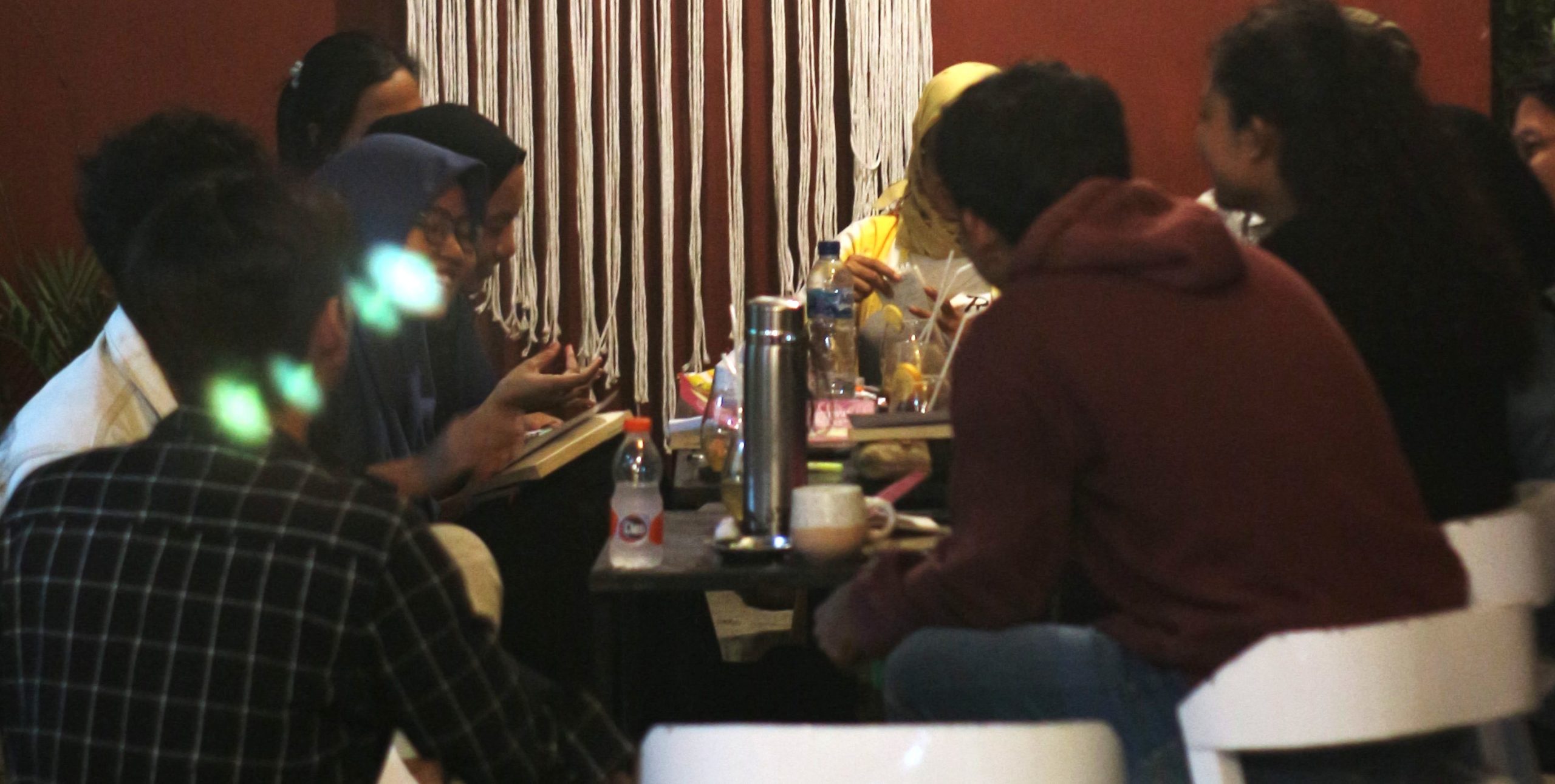Reporter: Napol Riel
The book discussion “Pesantren, Seksualitas, dan Kekerasan Seksual” (Islamic Boarding Schools, Sexuality, and Sexual Violence) or commonly called “Buku Pink” (the Pink Book) was held again on Thursday, October 24, 2024 at 19.00-22.00 WIB. The Umah Ramah team together with Ayuning Dharma Malik and young people from Cirebon City and Regency sat together while enjoying fresh drinks and coffee at Kopi Satu Visi, Jalan Mekar Mulya RT 02 RW 11, Karya Mulya Village, Kesambi District, Cirebon City. The fourth monthly book discussion raised the topic of sexual violence experiences.
Mahirotus Sofa opened the discussion by reminding the points that were previously discussed, that is related to experiences of sexuality in the dimensions of self, public space and behavior. Then the main points that will be discussed were mentioned, including differences in understanding of sexual violence; forms of sexual violence; and handling of sexual violence. The main points of discussion, in the context of the research results in Buku Pink, namely in the pesantren surroundings. Sofa asked Ayuning to share her reflections on the reading to spark discussion.
“Prior to reading this book, I believed that sexual violence was limited to rape. Many people share this viewpoint. We have no idea that there are many forms of sexual violence. Not only physical, but also non-physical non-consensual ones,” Ayuning explained.
According to her, if this is not corrected, we will continue to regard the numerous harmful actions that occur as non-sexual violence, even normal.
“For non-physical ones, for example, what I frequently hear, is catcalling. If we don’t know, we assume that catcalling is simply someone seeking attention. But we who experience it are uncomfortable. So it happens small, but the impact is really annoying,” she said.
In addition to being done by strangers, catcalling is also sometimes accompanied by condescending stares. Ayuning learned the term catcalling after reading and truly felt that the action demeans someone, “I can’t believe it. What on earth are they doing?! Like, for what?”
She stated that she was astonished to learn that sexual violence happened frequently in Islamic boarding schools. Every now and then, she paused and reread it. She cannot complete this book in one sitting because the real-life stories depicted draw her in. Ayu really appreciates Islamic boarding schools that have a handling mechanism that supports and protects people who experience sexual violence, such as in one of the stories written in this book.
Regarding catcalling, Sofa also responded, “It’s not just annoying. But sometimes from catcalling, people who experience it don’t realize that the experience has a traumatic effect. For example, every time I go out, I’m always anxious, for example, when there are many men on the side of the road, or when I go to a shop.”
Abdul Rosyidi, a writer and one of the researchers in the Pink Book, emphasized the significant gap in societal perceptions of sexual violence.
“When the Umah Ramah team visited the Islamic boarding school and spoke with the resource persons. Whether it is students, alumni, caretakers of Islamic boarding schools, service providers, and we interview them, the tricky issue is that when we talk about sexual violence, what we mean and what is in their thinking turns out to be different,” said Rosyid.
To bridge what sexual violence means and then align perceptions, it takes quite a long time to explain, meet many times, then talk in discussion forums. Because, according to Umah Ramah, there are numerous factors that prevent the same perception.
“The most obvious example occurred when we asked one of the Islamic boarding school’s caretakers about how the school prevents sexual violence. His answer was by separating male and female students. That surprised us, because it means that in their minds, sexual violence is zina (adultery),” he added again.
According to Rosyid, the Umah Ramah team discovered three barriers to differences in perception about sexual violence not only in Islamic boarding schools but also in the general public, based on research conducted through interviews and focus group discussions. Firstly, sexual violence is defined as rape or getting pregnant outside of marriage.
Second, sexual violence is considered equivalent to adultery. Herein lies the stark contrast between sexual violence in its broadest sense, as defined by Komnas Perempuan (the National Commission on Violence Against Women) and WHO, and what most people, including those attending Islamic boarding schools, understand.
Third, people continue to misunderstand the absence of a consensual principle in unequal power relations. For example, in cases of sexual violence against children, students, university students, and Islamic boarding school students. This is also related to how sexual violence is very likely to occur through sexual-grooming.
The lively discussion lasted until late in the evening. Discussing various phenomena related to sexuality and sexual violence in the surrounding environment, including children’s games that mimic adult sexual behavior, the relationship between parenting patterns on boys and how they relate to women as adults, communication patterns between children and their parents, and how to distinguish between love and sexual desire. []
This article was translated by Napol Riel.
